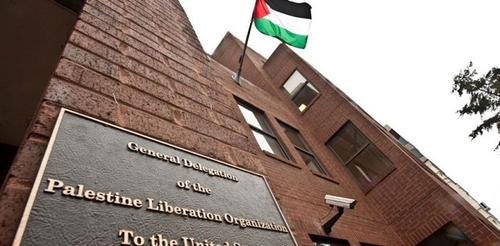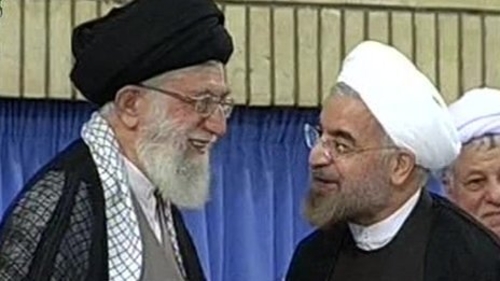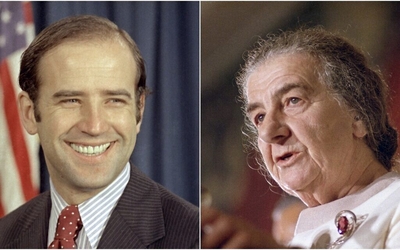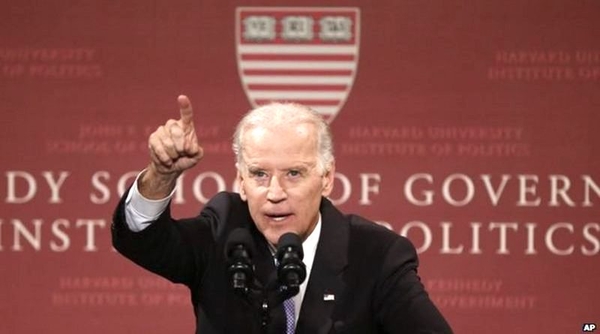Michael Johns: What are the most significant day-one policy changes the Biden administration will likely make toward the Middle East?
Daniel Pipes: To answer, I refer back to two basics: First, just as Trump came to office with an intent to reverse Obama's policies, so Biden intends to reverse Trump's. Second, his near-half-century in government makes Biden the very personification of the Democratic Establishment. In tandem, these two insights lead me to predict an immediate return to traditional and conventional policies. As for day-one changes concerning the Middle East: I doubt that Biden can do much more than signal his intentions via telephone calls to leaders and issue executive orders. One E.O. may permit emigration from the thirteen hostile or chaotic countries that Trump banned; the other may allow the Palestinian Authority to re-open its mission in Washington.
 Will the Palestinian Authority be permitted to re-open its Washington mission? |
Q: Vice President Biden has signaled his intention to return to President Obama's Joint Comprehensive Plan of Action (JCPOA), the Iran nuclear deal. Will this happen?
A: The answer depends in large part on a factor beyond Biden's control, namely Iran's internal politics, for the deal is as contentious in Iran as in the United States. The pragmatic Rouhani-Zarif faction wants to bring the United States back in; the ideological faction headed by Khamene'i never liked the deal and wants to charge a high price for re-engaging (literally: it demands a hefty American down-payment). Given these dynamics, plus a more explicit lobbying effort in Washington by the Sunni Arab states than was the case in the Obama years, I am inclined to think the U.S. government will find it hard to reenter the JCPOA on acceptable terms.
 Leaders of the two Iranian factions, Khamene'i and Rouhani. |
Q: How do you expect the Biden administration to handle Iran's aggressive actions beyond its borders, especially in Iraq and the Persian Gulf?
A: Obama downplayed Iranian trespasses in pursuit of an agreement; Biden may be tempted to do likewise. That said, developments over the past four years will obstruct an easy return to the status quo ante. Domestic opposition to Iran has become a significant factor in Yemen, Lebanon, and Iraq, while the Saudis and others show greater determination to oppose Tehran.
 Lebanese demonstrations against Iran even reached New York City, as here on Oct. 26, 2019, near the United Nations headquarters. (© Daniel Pipes) |
Q: How much will the recent cascade of Arab-Israeli diplomatic normalization reshape the Middle East?
A: Plenty. The shift in relations between the Sunni Arab states and Israel has been a long time in the making; after all, the Abdullah Plan was unveiled in 2002, while the last full-scale war between the Arab states and Israel took place in 1973 (coincidentally, the same year Joe Biden entered the Senate). Over the decades, the Arab states have been increasingly uneager to fight Israel and more prone to deal with it, a trend pushed further along by steep declines in energy prices in 2014 and 2020, the JCPOA, a growing anti-Islamist mood, and Trump's urgings. Unless something highly unexpected takes place, this evolution should continue. Israel already has formal relations with 6 out of 22 members of the Arab League; that number will likely increase.
Q: Will those developments change the way the Biden administration deals with Israel and the Israeli-Palestinian conflict?
A: Yes. The Biden team is inclined to give Mahmoud Abbas and the Palestinian Authority a veto over much of Middle East diplomacy; it's that old chestnut, linkage, the misbegotten notion that the Arab-Israeli conflict drives the Middle East, that progress everywhere requires a Palestinian blessing. Generally speaking, Arab state leaders have become impatient with the PA's rejectionism and do not want to be limited by it. Should the White House meet with protestations against discredited linkage from Khartoum and maybe even Algiers, it will have to reconsider its presuppositions.
Q: Will Biden have as difficult a relationship with Prime Minister Netanyahu as Obama did?
A: Yes; perhaps it will go a bit more smoothly, but tensions will inevitably predominate given the growing ranks of anti-Zionists in the Democratic party and Biden's own long-standing superior, sanctimonious, and didactic attitude toward the Jewish state. Here's a paraphrase of a contemporaneous Israeli report on Biden's meeting with then-Prime Minister Golda Meir in 1973 that requires only substituting Trump's name for Nixon's almost to apply today: "Biden criticized the Nixon administration for being 'dragged by Israel,' complaining that it was impossible to have a real debate in the Senate about the Middle East as senators were fearful of saying things unpopular with Jewish voters."
 Joe Biden met Golda Meier soon after his arrival to the Senate in 1973. |
Q: On Twitter last month, you gave President Trump better marks on his Middle East policy than Vice President Biden except vis-à-vis Turkey, where you rated Trump as "terrible" and Biden as "good." Why so?
A: Trump gave a pass to Recep Tayyip Erdoğan on every issue but a bizarrely minor one (concerning Pastor Andrew Brunson's detention). Some observers tie this softness to Trump's financial interests in Turkey, an interpretation he himself – oddly – has encouraged. But I see it more as an instance of a weird tendency toward bromance with dictators, including Vladimir Putin and Kim Jong-un. In contrast, Biden is part of the mainstream on this issue, dubbing Erdoğan an "autocrat" and calling for a range of tougher policies vis-à-vis Turkey concerning such issues as Mediterranean gas exploration, the Incirlik Air Base, and the Kurds.
Q: Obama discouraged the democracy movement against a hostile regime in Iran and encouraged it against a friendly one in Egypt; what was the calculus behind that stance, and will we see a reprise with Biden?
A: It's a classic instance of double standard, of treating an enemy regime gently in an effort to lure it and an ally harshly because it gets under your skin. Think Russia and Poland or China and Taiwan. Obama staked his foreign policy reputation on a deal with Iran and would not let a pesky civil uprising get in his way; he also had a distaste for Mubarak and saw no reason to come to his aid. I expect Biden to repeat this same pattern, if somewhat less acutely.
 Then-Vice President Joe Biden speaking at Harvard Kennedy School in 2014. |
Q: The Trump administration has just announced the withdrawal of thousands of troops from Iraq and Afghanistan. Are these wise decisions?
A: No, they open the way to further disruption in the two countries, countries where the United States has lost thousands of lives and invested trillions of dollars. This abrupt, last-minute shift probably results from Trump's sense that he must keep his promise to end what he calls America's "forever wars." But, given the fact he will be a private citizen in a few weeks, it is highly irresponsible for him to start this major initiative so late in his term.
Q: Where does it leave the incoming administration?
A: It faces the unattractive choice of accepting Trump's fait accompli or undoing it. The latter will not be an easy task, given how the withdrawal changes attitudes in the foreign countries and in the United States. In brief, Trump left a stink bomb in the Resolute desk for his successor.
